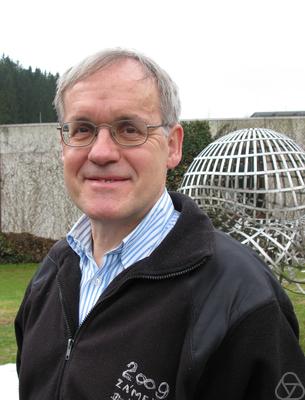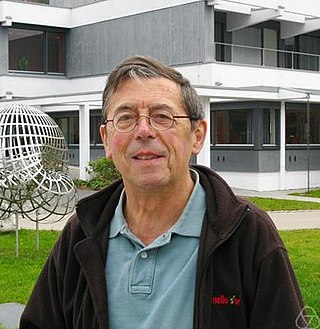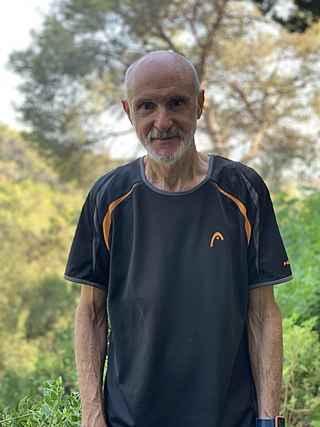Related Research Articles

Combinatorial optimization is a subfield of mathematical optimization that consists of finding an optimal object from a finite set of objects, where the set of feasible solutions is discrete or can be reduced to a discrete set. Typical combinatorial optimization problems are the travelling salesman problem ("TSP"), the minimum spanning tree problem ("MST"), and the knapsack problem. In many such problems, such as the ones previously mentioned, exhaustive search is not tractable, and so specialized algorithms that quickly rule out large parts of the search space or approximation algorithms must be resorted to instead.
In computer science and mathematical optimization, a metaheuristic is a higher-level procedure or heuristic designed to find, generate, tune, or select a heuristic that may provide a sufficiently good solution to an optimization problem or a machine learning problem, especially with incomplete or imperfect information or limited computation capacity. Metaheuristics sample a subset of solutions which is otherwise too large to be completely enumerated or otherwise explored. Metaheuristics may make relatively few assumptions about the optimization problem being solved and so may be usable for a variety of problems.

Éva Tardos is a Hungarian mathematician and the Jacob Gould Schurman Professor of Computer Science at Cornell University.

Christos Charilaos Papadimitriou is a Greek theoretical computer scientist and the Donovan Family Professor of Computer Science at Columbia University.

Jack R. Edmonds is an American-born and educated computer scientist and mathematician who lived and worked in Canada for much of his life. He has made fundamental contributions to the fields of combinatorial optimization, polyhedral combinatorics, discrete mathematics and the theory of computing. He was the recipient of the 1985 John von Neumann Theory Prize.

Eduardo Daniel Sontag is an Argentine-American mathematician, and distinguished university professor at Northeastern University, who works in the fields control theory, dynamical systems, systems molecular biology, cancer and immunology, theoretical computer science, neural networks, and computational biology.

Jaroslav (Jarik) Nešetřil is a Czech mathematician, working at Charles University in Prague. His research areas include combinatorics, graph theory, algebra, posets, computer science.
Thomas Lee Magnanti is an American engineer and Institute Professor and former Dean of the School of Engineering at the Massachusetts Institute of Technology.
Ellis Lane Johnson is the Professor Emeritus and the Coca-Cola Chaired Professor in the H. Milton Stewart School of Industrial and Systems Engineering at Georgia Institute of Technology in Atlanta, Georgia.

Fred Glover is Chief Scientific Officer of Entanglement, Inc., USA, in charge of algorithmic design and strategic planning for applications of combinatorial optimization in quantum computing. He also holds the title of Distinguished University Professor, Emeritus, at the University of Colorado, Boulder, associated with the College of Engineering and Applied Science and the Leeds School of Business. He is known for his innovations in the area of metaheuristics including the computer-based optimization methodology of Tabu search an adaptive memory programming algorithm for mathematical optimization, and the associated evolutionary Scatter Search and Path Relinking algorithms.
Eugene Leighton (Gene) Lawler was an American computer scientist and a professor of computer science at the University of California, Berkeley.

Michel Xavier Goemans is a Belgian-American professor of applied mathematics and the RSA Professor of Mathematics at MIT working in discrete mathematics and combinatorial optimization at CSAIL and MIT Operations Research Center.

George Lann Nemhauser is an American operations researcher, the A. Russell Chandler III Chair and Institute Professor of Industrial and Systems Engineering at the Georgia Institute of Technology and the former president of the Operations Research Society of America.

Alexander (Lex) Schrijver is a Dutch mathematician and computer scientist, a professor of discrete mathematics and optimization at the University of Amsterdam and a fellow at the Centrum Wiskunde & Informatica in Amsterdam. Since 1993 he has been co-editor in chief of the journal Combinatorica.

Laurence Alexander Wolsey is a Belgian-English mathematician working in the field of integer programming. His mother Anna Wolsey-Mautner was the daughter of the Viennese Industrialist Konrad David Mautner. He is a former president and research director of the Center for Operations Research and Econometrics (CORE) at Université catholique de Louvain in Belgium. He is professor emeritus of applied mathematics at the engineering school of the same university.

Gérard Pierre Cornuéjols is the IBM University Professor of Operations Research in the Carnegie Mellon University Tepper School of Business and professor at Aix-Marseille University. His research interests include facility location, integer programming, balanced matrices, and perfect graphs.
Daniel Mier Gusfield is an American computer scientist, Distinguished Professor of Computer Science at the University of California, Davis. Gusfield is known for his research in combinatorial optimization and computational biology.
Pascal Van Hentenryck is the A. Russell Chandler III Chair and Professor of Industrial and Systems Engineering at Georgia Tech. He is credited with pioneering advances in constraint programming and stochastic optimization, bridging theory and practice to solve real-world problems across a range of domains including sports scheduling, protein folding, kidney matching, disaster relief, power systems, recommender systems, and transportation. He has developed several optimization technologies including CHIP, Numerica, the Optimization Programming Language, and Comet. He has also published several books, including Online Stochastic Combinatorial Optimization, Hybrid Optimization, and Constraint-Based Local Search.
Maria Grazia Speranza is an Italian applied mathematician and operations researcher. Her research involves the application of mathematical optimization to problems including portfolio optimization and the combination of inventory management with vehicle routing.

Shmuel Onn is a mathematician, Professor of Operations Research and Dresner Chair at the Technion - Israel Institute of Technology. He is known for his contributions to integer programming and nonlinear combinatorial optimization.
References
- ↑ Summary of Personnel Actions, Regents of the University of Michigan, October 2011, retrieved 2012-02-25.
- 1 2 Faculty appointment dossier at Univ. of Michigan, September 2011, retrieved 2012-02-25.
- ↑ Jonathan Lee at the Mathematics Genealogy Project
- ↑ INFORMS Optimization Society, Officers, INFORMS, retrieved 2018-01-26.
- ↑ Mathematical Programming (Springer).
- ↑ INFORMS Computing Society Prize Archived 2010-10-20 at the Wayback Machine , INFORMS Computing Society, retrieved 2018-01-25.
- ↑ INFORMS Fellows Class of 2013, INFORMS, retrieved 2018-01-25.